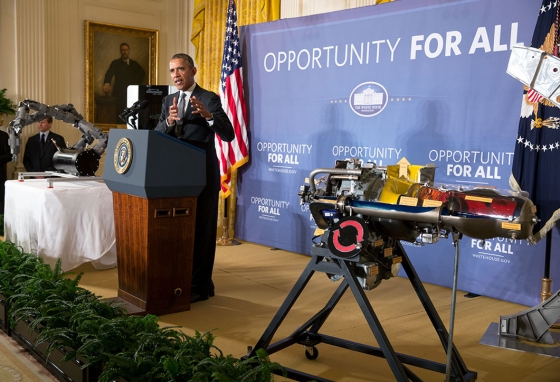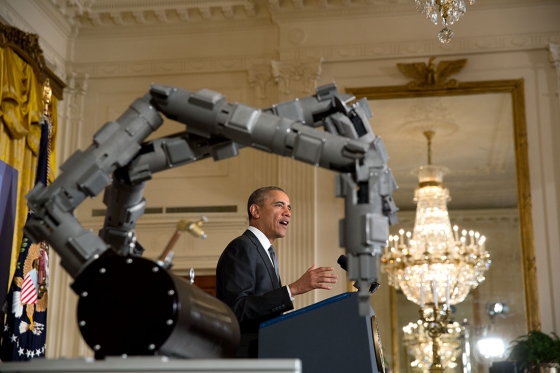
President Barack Obama delivers remarks announcing two new public-private Manufacturing Innovation Institutes: White House/Pete Souza
By Glynn Wilson –
President Barack Obama announced Wednesday that he will ask Congress for $300 billion to begin rebuilding the nation’s infrastructure starting with aging roads and railways, making the argument that the taxpayer investment is a worthy cause that will pay huge dividends by attracting businesses and helping get unemployed people back to work.
Congressional funding for transportation programs expires later in 2014, and the White House says 700,000 jobs could be at risk unless Congress acts to renew the program. The president announced his plan at the Union Depot rail and bus station in St. Paul, Minnesota after touring a light rail maintenance plant, according to AP.
“At a time when companies are saying they intend to hire more people this year, we need to make that decision easier for them,” the president said, by rebuilding aging transportation systems, power grids, communications networks and other projects that enhance commerce.
“The bottom line is there’s work to be done, workers ready to do it,” he said, adding that one of Congress’ major responsibilities is to help states and cities pay for such projects.
Transportation Secretary Anthony Foxx warned that of a “transportation cliff” coming in August or September when the Highway Trust Fund, which finances federal highway and transit projects, is forecast to run out of money. It will need $100 billion over the next six years just to maintain current transportation spending levels.
Because of the ongoing fight over the budget, taxes and the deficit, the president and Congress have been unwilling to raise federal gasoline and diesel fuel taxes, the primary source of federal transportation funding for decades.
The American Automobile Association has criticized Washington’s refusal to increase fuel taxes to pay for road projects. Kathleen Bower, AAA vice president of public affairs, called a gas tax increase “the most viable, responsible and effective near-term solution” for keeping the trust fund solvent.
The association will continue to discuss long-term funding remedies, such as corporate tax reform or other fixes, Bower said, but added that “immediate action is necessary” on a short-term funding solution for the transportation system.
In the budget Mr. Obama will send to Congress next week, however, the president will propose that half of the $302 billion he’s seeking come from an overhaul of the corporate tax system instead of an increase in fuel taxes.
Also on Wednesday, Michigan Republican Dave Camp, chairman of the tax-writing House Ways and Means Committee, announced a corporate tax overhaul plan that would dedicate $126.5 billion in corporate tax revenue to the Highway Trust Fund over the next eight years. It is unclear whether the more conservative members of Congress beholden to the tea party right will support such a measure.
As part of the president’s promise to take action where Congress won’t, Mr. Obama also announced a $600 million competition for federal grants to help local governments pay for infrastructure projects.
The primary sources of revenue for the Highway Trust Fund are the federal 18.4 cent-per-gallon gasoline and 24.4 cent-per-gallon diesel fuel taxes, which have remained the same for 20 years. Highway construction costs have been going up for decades, but revenue going into the fund has gone down. Why?
Because vehicles are going more miles on a gallon of gas and people are driving less, not a bad thing overall.
The fund experienced its first shortfall in 2008, President George W. Bush’s last year in office, and since then, Congress has shifted tens of billions of dollars from the general fund to make up continuing shortfalls. Some of the transfers are paid for with spending cuts or tax increases elsewhere in the budget.
The nonpartisan Congressional Budget Office has estimated that the trust fund will not have enough money to meet its obligations to states by the end of the budget year on Sept. 30. Even if Congress transfers enough money to keep aid flowing, current spending levels are not enough to keep up with repair and replacement of the nation’s aging infrastructure.
Three blue-ribbon commissions have called for raising the gasoline tax and indexing it to inflation. But congressional leaders and the White House have shied away from a fuel tax increase, which is considered a politically dangerous move in the ongoing anti-tax fervor on the political right.
The Blue Green Alliance of labor union leaders and environmental activists have been pushing for a program to rebuild the nation’s crumbling infrastructure to both provide high paying union jobs and fight environmental problems such as climate change due to global warming from the burning of fossil fuels. Obviously the White House is listening, if the mainstream media in America is mostly AWOL from that story.
On his swing through the the Mid-West this week, the president announced two new public-private manufacturing innovation institutes – one in Chicago and one in the Detroit area — as well as a competition for the first of four additional institutes that will will boost advanced manufacturing in the United States and attract the types of high-quality jobs that a growing middle class requires.
“For generations of Americans, manufacturing was the ticket to a good, middle-class life. The stuff we made – like steel and cars and planes – is what made America what it is,” President Obama said. “But advances in technology allowed manufacturers to do more with less, and global competition meant a lot of good manufacturing jobs went overseas.”
Today, our manufacturing industry is adding jobs — more than 620,000 over the last four years, he said.
“But the economy has changed,” he said. “And if we want to attract more good manufacturing jobs to America, we’ve got to make sure we’re on the cutting edge of new manufacturing techniques and technologies.”
That’s what these new hubs are all about. They’re partnerships – they bring together companies and universities to develop cutting-edge technology, train workers to use that technology, and make sure research is turned into real-world products made by American workers, according to the White House.
Each institute serves as a regional hub, bridging the gap between applied research and product development by bringing together companies, universities and other academic and training institutions, and federal agencies to co-invest in key technology areas that encourage investment and production in the U.S.
This type of “teaching factory” provides a unique opportunity, the White House says, for education and training of students and workers at all levels, while providing the shared assets to help companies, most importantly small manufacturers, access the capabilities and equipment to design, test, and pilot new products and manufacturing processes.

President Barack Obama delivers remarks announcing two new public-private Manufacturing Innovation Institutes: White House/Lawrence Jackson
Learn more about this program on the White House Website.














Guess I’m going to just have to put some of these important but non-sensational videos in the comments and on Facebook to get people to pay attention to them.
Good Jobs, Green Jobs Conference 2014 Kicks Off at the Washington Hilton
Tell me again how these infrastructure projects are gonna create new business opportunities for the job creators. (sic)
Is this journalism or cheerleading?
Didn’t the president have an on-the-job learning experience about shovel-ready jobs, which is what is written between the lines?
These ‘hubs’ will become no more than political power centers, with competition for money as the force behind them. This is rife for waste and abuse. Have we learned nothing?
Of course labor unions have joined in the chorus- can we please set up payment on ways that reward efficiency, timeliness and budgetary adherence?
Gene: I assume you are being funny, LOL : )
Sooser: Yes, it is journalism. It is called reporting. First you have to report what is being said, what is proposed. Then you can comment on it.
I think you are mistaking President Obama for Bush. As for “budgetary adherence,” I’m a very educated man, but I have no idea what that means. Is that a term Sean Hannity uses?
It is widely accepted economics that the government must play an active role in the economy to stimulate jobs when the economy is down. Sorry you don’t get that story on talk radio or Fox News.